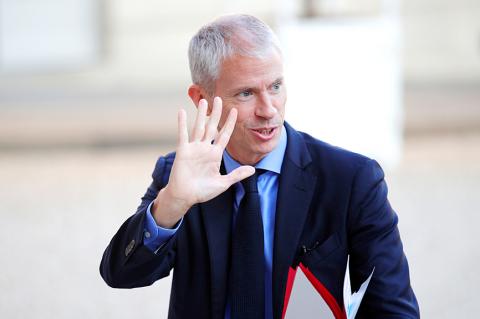French Minister of Culture Franck Riester urged people to cut down on their increasing use of English, in the latest effort to protect the French language, even though French President Emmanuel Macron himself often slips English idioms into his speech.
France has long been proud of its culture and language, and has constantly sought to defend it against the encroachment of the English language and the habits of the US, which are often dismissively referred to as “Les Anglo-Saxons.”
Riester made his plea to stick to French in a Twitter post published late on Sunday and marking the 25th anniversary of a law governing the use of French on television and radio.

Photo: Reuters
Critics yesterday rounded on his patriotic views, saying Macron regularly uses English idioms, such as the phrase “Start-Up Nation” to promote French innovation and technology, as do many of France’s top businesses.
“Macron himself uses Anglophone slogans!” Didier VanStaevel said, replying on Twitter to Riester, while others pointed to Macron having referred once to democracy as being a “bottom-up” system.
Cinema executive Christophe Courtois said that top French companies regularly use English slogans rather than French, such as Renault’s adverts titled “Never Too Much” and Air France’s “France Is In The Air” posters.
The 1994 Toubon law made the use of French mandatory in all TV broadcasts, meaning all foreign-language programs are dubbed, while radio stations must play at least 40 percent of French music for most of the day.
“The Loi Toubon is 25 years old! It’s the interpretation of article 2 of our Constitution — “The Language of the Republic is French.” Our daily lives would be so different without this simple demand — say things in French!” Riester wrote.
His tweet called for vigilance applying the law and was accompanied by a big picture of the country’s national flag, the “Tricolore.”
Ministry officials could not be immediately reached for further comment on the matter.
In 2006, then-French president Jacques Chirac walked out of an EU summit briefly as a form of protest, when the French head of the EU’s industry lobby addressed leaders of the bloc in English.

Auschwitz survivor Eva Schloss, the stepsister of teenage diarist Anne Frank and a tireless educator about the horrors of the Holocaust, has died. She was 96. The Anne Frank Trust UK, of which Schloss was honorary president, said she died on Saturday in London, where she lived. Britain’s King Charles III said he was “privileged and proud” to have known Schloss, who cofounded the charitable trust to help young people challenge prejudice. “The horrors that she endured as a young woman are impossible to comprehend and yet she devoted the rest of her life to overcoming hatred and prejudice, promoting kindness, courage, understanding

US President Donald Trump on Friday said Washington was “locked and loaded” to respond if Iran killed protesters, prompting Tehran to warn that intervention would destabilize the region. Protesters and security forces on Thursday clashed in several Iranian cities, with six people reported killed, the first deaths since the unrest escalated. Shopkeepers in Tehran on Sunday last week went on strike over high prices and economic stagnation, actions that have since spread into a protest movement that has swept into other parts of the country. If Iran “violently kills peaceful protesters, which is their custom, the United States of America will come to

‘DISRESPECTFUL’: Katie Miller, the wife of Trump’s most influential adviser, drew ire by posting an image of Greenland in the colors of the US flag, captioning it ‘SOON’ US President Donald Trump on Sunday doubled down on his claim that Greenland should become part of the US, despite calls by the Danish prime minister to stop “threatening” the territory. Washington’s military intervention in Venezuela has reignited fears for Greenland, which Trump has repeatedly said he wants to annex, given its strategic location in the arctic. While aboard Air Force One en route to Washington, Trump reiterated the goal. “We need Greenland from the standpoint of national security, and Denmark is not going to be able to do it,” he said in response to a reporter’s question. “We’ll worry about Greenland in

PERILOUS JOURNEY: Over just a matter of days last month, about 1,600 Afghans who were at risk of perishing due to the cold weather were rescued in the mountains Habibullah set off from his home in western Afghanistan determined to find work in Iran, only for the 15-year-old to freeze to death while walking across the mountainous frontier. “He was forced to go, to bring food for the family,” his mother, Mah Jan, said at her mud home in Ghunjan village. “We have no food to eat, we have no clothes to wear. The house in which I live has no electricity, no water. I have no proper window, nothing to burn for heating,” she added, clutching a photograph of her son. Habibullah was one of at least 18 migrants who died